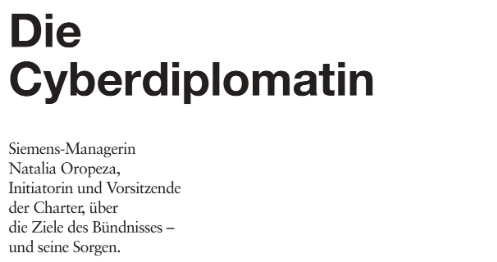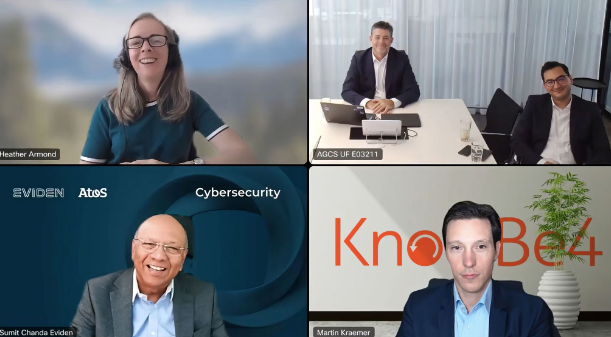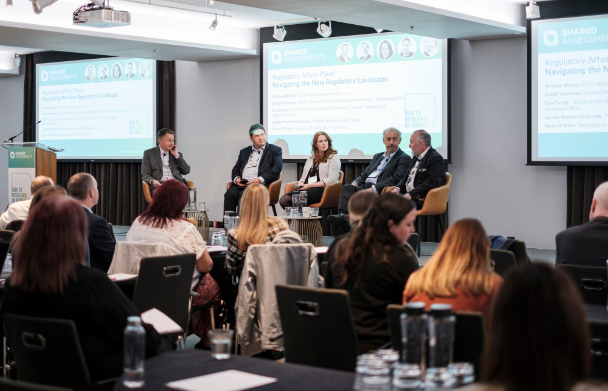Today's opening of the 2023 Munich Security Conference marks the fifth anniversary of the Charter of Trust (CoT). This celebration is an opportunity to reflect on the alliance's achievements and growth since 2018.This milestone is also an opportunity to discuss the path ahead for cybersecurity, as the world faces unprecedented levels of cyberthreats. The CoT remains convinced that secure and trusted digital technologies, infrastructures, products and solutions are the prerequisite for overcoming our global challenges.
Never before has the Munich Security Conference (MSC) faced such a wide variety of issues: War in Europe, escalating geopolitical tensions in the Asia-Pacific region, global supply shocks and energy shortages are just a few headlines currently raising security concerns. From data theft and sabotage of critical infrastructures and political institutions in major democracies to attacks on utilities in war-torn regions, one aspect is central to most of today’s threats: cybersecurity. Unfortunately, cybersecurity is often awarded lower priority than the more tangible realities of the crises themselves. This negligence can be a catalyst for cyberattacks, with dire political, economic and social consequences.
Cyberspace holds countless opportunities for governments, companies and private individuals alike. But it is not free of dangers, since novel technologies and digital innovations can be exploited by criminals or rogue entities for personal and political gains. Cyberattacks, spyware and ransomware have caused significant damage across a wide range of areas in recent years. Since 2021, ransomware has among other things been used to disrupt national healthcare systems, shut down crucial oil pipelines and incapacitate government agencies. The scale and scope of such attacks is increasing; the cost of cybercrime to the world economy is estimated at as much as $10.5 trillion by 20251. The dangers of insufficient cybersecurity are most dramatic in the context of international conflict: State-sponsored cyberattacks can take on a multitude of forms, ranging from espionage and disinformation to attacks on critical infrastructures and companies, as recently seen in Ukraine.
Such threats call for international, non-partisan efforts to ensure the crucial security of IT systems against cyberattacks. Based on this premise, Siemens and eight industry partners established the Charter of Trust at the 2018 MSC. The mission of the alliance, which is still in focus today, is to create the trust needed in IT systems for consumers, companies and governments to build a cybersecure future worldwide.
Rallying to this mission, the CoT now counts 17 multinational and cross-industrial members, with Microsoft joining in November 2022. The CoT has also grown its pool of Associated Partners to establish a global network of regulators, research institutes, universities and think-tanks sharing its vision for a stronger digital security environment. There are now 13 Associated Partners, with 5 new partners joining in 2022: the Cloud Security Alliance, the CyberPeace Institute, the Global Cyber Alliance, the Brazilian Center for International Relations (CEBRI) and the South African Council for Scientific and Industrial Research (CSIR).
The CoT has spent its first five years focusing on how to protect the data of individuals and businesses and to prevent damage to people, companies and infrastructure, as well as to secure the foundation for confidence as the basis for a flourishing networked, digital world. Among the many measures launched by the CoT, the “Security by Default” principle has invited partners to integrate security concerns as early as the design phase. Members have also committed to pass on baseline cybersecurity requirements to their suppliers, with the aim of enhancing cybersecurity along the entire supply chain. In its efforts to implement a cross-industry approach, the CoT has focused on providing information, training and other resources to small and medium-sized enterprises.
Trustworthy AI is part of the CoT’s portfolio. A critical aspect of cybersecurity that focuses on the development and deployment of AI systems that are reliable, secure, and transparent. Trustworthy AI can help prevent, detect, and respond to security threats in a responsible and ethical manner. Without trustworthy AI systems, they can turn into security vulnerabilities that can be used in malicious ways. Ensuring trustworthy design and deployment of AI systems is crucial for the overall security of digital systems and infrastructure.
Looking ahead, the CoT is committed to use its cybersecurity toolbox – baseline requirements, resources and capabilities – to provide all interested stakeholders with unique guidance on how to promote cyber-resilience and navigate complex cybersecurity technology and regulatory rulebooks. Most recently, the CoT published on its website a guideline document for achieving secure development life cycles. The guideline shows how a product or service can be designed within a secure development process and how to integrate the baseline security mechanism.
Natalia Oropeza, Chief Cybersecurity Officer & Chief Diversity Officer at Siemens: “The Charter of Trust calls for peace, solution-focused policies and international collaboration. We are convinced that only with secure and trusted digital technologies, infrastructures, products, and solutions will we overcome global challenges.”
Meeting in Munich today on the margins of the 2023 MSC, CoT members will have the opportunity to reflect on the work accomplished since the alliance’s inception and pave a way forward.
You can follow these discussions virtually by registering here: cot2023.events.dc.siemens.com
Find out more about the Charter of Trust on our website: www.charteroftrust.com/about/


You may also like

Chairwoman Natalia Oropeza in Brandeins Magazine
In an interview with Dorit Kowitz, Natalia dives deep into the pressing issues facing the cybersecurity landscape, explaining how the Charter of Trust bundles the expertise of different businesses across several regions to stay resilient in the face of evolving threats. As Natalia Oropeza says: "We all win if cybercrime doesn’t win."
Here are three key insights from her interview:
🔑 Collaboration is essential: No single organization can tackle cyber threats alone. The Charter of Trust is a prime example that businesses nowadays are more transparent when it comes to attacks and that sharing information in this field can be beneficial.
🔑 Addressing the digital skills gap: The Charter of Trust is working to address the global shortage of cybersecurity professionals by encouraging diversity and actively promoting opportunities for women to join the field.
🔑 Unified regulations: Harmonizing global cybersecurity standards will reduce vulnerabilities, helping businesses and governments combat threats more effectively.
The full interview is available here: https://lnkd.in/gRm6ZDGC


Cybersecurity Awareness Month
The complexity and urgency of this topic gathered a lot of interest, with 600+ attendees throughout the whole panel, which was composed of Jon-Paul Jones, COO at AZ Commercial, Firas Ben Hassan, GenAI expert & Manager of AllianzGPT at AZ Technology, Dr. Martin J. Krämer, External Security Awareness Advocate at KnowBe4, and Dr Sumit Chanda, Global CISO at Eviden & Chair of the Global External Engagement Working Group at the Charter of Trust.
We are pleased to see Dr. Sumit Chanda from Eviden bringing in his unique CISO insight on what these emerging technologies mean in day-to-day cybersecurity practices and bringing in the Charter of Trust perspective on this topic as well.
Thank you, Ervin Cihan and Haydn Griffiths for inviting other CoT Partners and for the great initiatives that Allianz is putting together within this year’s Security Awareness Month. And special thanks to Heather Armond for the great moderation.


UK/EU Summit - “Risk to Resilience”
💡Under the theme “Risk to Resilience” the first event of this series was held in London and brought together professionals from different industries and regions. Detlef participated in the panel about the complex regulatory landscape and emphasized that new legislation like the EU AI Act, DORA and Hashtag#NIS2 continue to push the standard of care on cybersecurity and other risks.
Thanks to Shared Assessments for organizing such an amazing event and inviting the Charter of Trust to participate in this high-class panel alongside Andrew Moyad, CEO at Shared Assessments.



